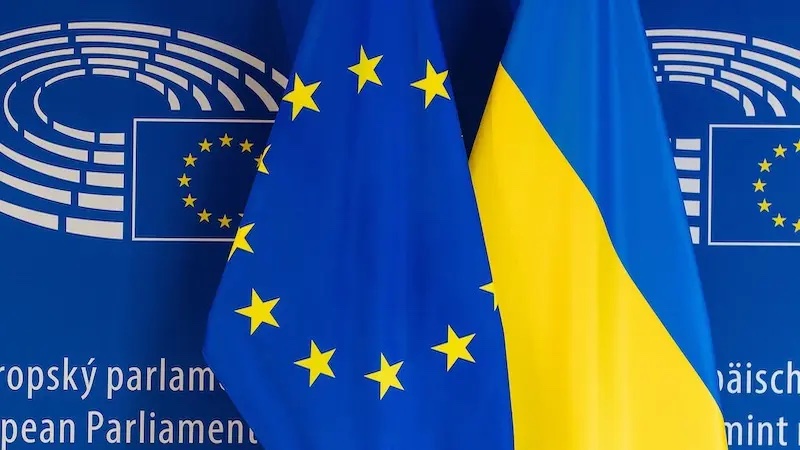
By Alexandra Brzozowski
(EurActiv) — Ukraine’s Western allies are racing to carry out freshly made decisions on long-term aid for Kyiv amid fears of Hungarian vetoes and Trump’s potential re-election curtailing US support.
Two years after Ukraine, and Moldova applied for EU membership, both will;officially open accession talks;in Luxembourg Tuesday (25 June) by holding the first Intergovernmental Conferences (IGC), that formally kick-start a process that could take many years.
EU officials had been sceptical whether the decision could be taken before Hungary takes over the EU’s rotating presidency on 1 July.
The step serves as a morale boost for Ukraine which is preparing for Russia’s summer offensive, and has had to fend off fresh military advances and the opening of a new front in the northeastern border region of Kharkiv, home to Ukraine’s second largest city.
In his nightly video address on Saturday (22 June), Ukraine’s President Volodymyr Zelenskyy said Russian forces had used more than 2,400 guided bombs on Ukrainian targets in June alone, with about 700 aimed at the war-torn city.
For military experts, the question remains whether Russia aims to create a buffer zone or to push deeper, and if Ukraine’s Western allies can provide what it needs in the long-term, despite political difficulties.
Those include a yet unclear EU insitutitonal set-up, the potential return of former US President Donald Trump to the While House in November or France’s snap elections which could see the far-right score record numbers.
EU leaders are also expected to back more military aid to Ukraine, especially to protect the country’s constantly targeted infrastructure and power grid.
“As Ukraine exercises its inherent right to self-defence, the European Council calls for stepping up the delivery of military support to Ukraine,” an early draft of the leaders’ summit communiqué states.
“In particular, air defence systems, ammunition and missiles are urgently needed to protect Ukraine’s population and critical energy infrastructure,” it adds.
As part of;a wider Western effort;to help the country combat Russia’s aggression, Zelenskyy is expected to sign a bilateral;security deal;between the EU and Ukraine this week, EU diplomats confirmed.
EU leaders are also expected to approve the transfer of windfall profits earned from immobilised Russian assets to Ukraine.
They could task EU officials to further explore the plan to provide Ukraine with a large up-front loan worth “approximately” €50 billion “to support Ukraine’s current and future military, budget and reconstruction needs” and secure Kyiv’s financing for the next year.
G7 leaders last week struck a political agreement;on the issue, but technical details were to be finalised in the coming weeks, with the new cash expected to reach Kyiv by the end of this year thanks to contributions from all G7 countries.
It remains yet unclear who would raise the money – the US or the EU.
Under the first option, supported by a majority of EU member states, Washington would raise the money on the market and Brussels would give assurances the windfall profits would be available to service the US borrowing.
This faster option would not create any new obligations for European countries in terms of joint debt. However, it remains unclear under what conditions risk-sharing would happen and any changes to the EU’s sanctions regime EU officials fear could be vetoed by Hungary.
Under a second option, the EU would borrow the money for Ukraine on its own, guaranteeing the repayment of bonds with money from the EU budget.
While the process would be EU-led, it would take longer as it would require parliamentary consent, which could take many months depending on how quickly the newly-elected European Parliament begins work. Plus, the risk associated with the joint EU borrowing is particularly disliked by Germany.
Hungary has said it wants the Russian frozen assets issue discussed by EU leaders at this week’s summit. They are also expected to address the;Hungarian vetoes on the various files, including the bloc’s further military aid.
